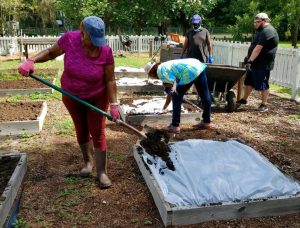Across the country, community gardens are cropping up in response to growing interest in producing local food. In a new study, University of Florida researchers ask what makes one of these gardens thrive — or wither.
By bringing people together to plant, tend and harvest fruits and vegetables, these gardens let people bond while providing nutritious food, said Paul Monaghan, a UF/IFAS associate professor of agricultural education and communication.
“Community gardens are a way for residents to get to know their neighbors, build friendships and come to look out for one another,” said Monaghan, who supervised a new study on how to establish and maintain such gardens.
New UF/IFAS research shows social bonds among gardeners can help sustain community gardens. The study also shows that networking with other garden groups, governing boards and nonprofit agencies can solve problems that inevitably arise. Those issues can include access to suitable land, water, tools and gardening advice.
With funding from the UF/IFAS Center for Land Use Efficiency, Karissa Raskin, conducted the research as part of her master’s thesis. She measured the concepts of “bonding,” “bridging” and “linking,” all facets of social capital.
Researchers use the term “social capital” to describe the investment individuals and communities make in interpersonal relationships. Like putting money in the bank, people can build up social capital by contributing time, energy, skills or other resources to those relationships with the hope of future cooperation and reciprocation.

Raskin interviewed community garden volunteers during focus groups in Hillsborough, Orange, Manatee, Polk and Duval counties.
She also visited gardeners around the state and even started her own community vegetable garden in an underserved neighborhood of Gainesville — all to gain insight into what makes a garden successful.
Raskin saw examples of all forms of social capital within the gardens she examined. “Bonding capital” was the most prominent. The majority of the research participants spoke about the strong relationships cultivated within their gardens, referencing these bonds as being critical to the garden’s success and a key reason for their own personal involvement.
One participant illustrated the benefits of “bonding social capital” this way: “I meet people that are my neighbors that I never knew…and we are doing a lot of other things together, you know, biking together and doing other activities…now we have a kids playgroup, it’s really cool, there is just so much going on.”
Raskin also saw several examples of “bridging social capital.” This type of capital comes about through such activities as church membership or volunteering for neighborhood associations. A key benefit of bridging capital is that it brings together people with different backgrounds and skill sets to contribute their knowledge, time and labor to achieve a mutual goal.
On the other hand, “linking social capital” comes when you reach out to those with more power over decision-making, such as local governments, to solve problems and provide access to resources. It can be the most difficult type to attain because it relies on building connections between individuals and institutions outside of one’s network.
Raskin concluded that those who offer support to community gardens, including UF/IFAS Extension, can learn strategies by focusing on the forms of social capital. We can leverage social capital in a number of ways: by tapping into the local knowledge and resources shared by neighbors, gaining support for Extension programming within communities, raising awareness of local government to the benefits of community agriculture and education and even taking local elected officials on garden tours.
Sharing information between various gardens – whether they’re neighboring or far away — through newsletters and tours and forming gardening associations also can increase chances for success, Monaghan said.
“Those who wish to support and nurture community gardens don’t always need to know about seeds, soil and pest management,” he said. “They can be organizers who also help with the local political process and help gardeners collaborate with other partners.”
Raskin leveraged her research into a position with the city of Gainesville in the Office of Strategic Initiatives. She now helps neighborhoods and residents make connections to find the resources to solve problems such as food insecurity.
“Now I use the tools and experiences that I gained from my master’s degree every day in my work,” said Raskin. “It really is about strengthening the social connections among people.”
-30-
The mission of the University of Florida Institute of Food and Agricultural Sciences (UF/IFAS) is to develop knowledge relevant to agricultural, human and natural resources and to make that knowledge available to sustain and enhance the quality of human life. With more than a dozen research facilities, 67 county Extension offices, and award-winning students and faculty in the UF College of Agricultural and Life Sciences, UF/IFAS brings science-based solutions to the state’s agricultural and natural resources industries, and all Florida residents.
 1
1
